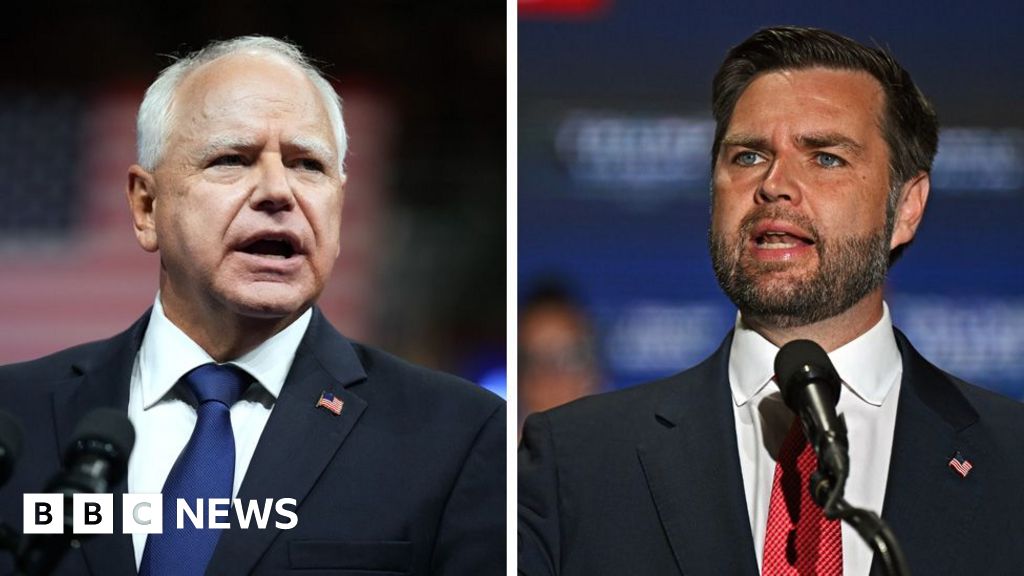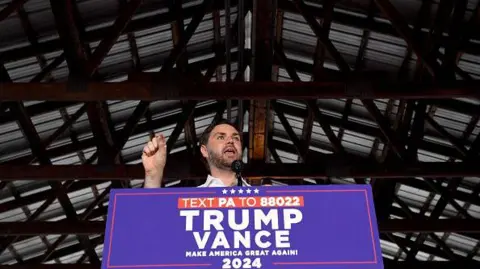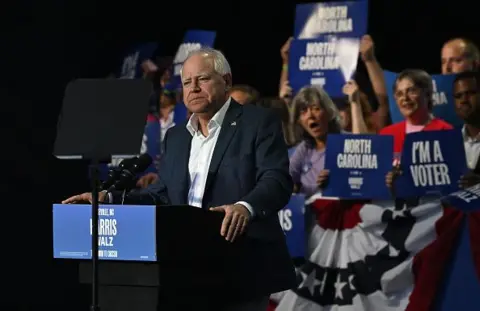Bussiness
What to know for the Vance v Walz vice-presidential debate

 Getty Images
Getty ImagesThe two US vice-presidential candidates are set to face each other on the debate stage, just over a month before the White House election.
Ohio Republican Senator JD Vance will square off against Minnesota’s Democratic Governor Tim Walz in New York City on on Tuesday night.
This debate comes three weeks after a single presidential clash between Donald Trump, who picked Vance as his running mate, and Kamala Harris, who picked Walz.
Here’s everything you need to know.
When and where is the debate?

The 90-minute clash will be held on Tuesday 1 October at 21:00 EDT (02:00 BST) at the CBS Broadcast Center in New York City.
It will be aired on CBS network TV and livestreamed on platforms where CBS News 24/7 and Paramount+ are accessible.
The forum will be moderated by CBS Evening News anchor Norah O’Donnell and by Margaret Brennan, who hosts the network’s current affairs show Face the Nation.
There will be two breaks, each lasting four minutes.
The BBC will have a team of reporters in New York and in Washington providing analysis, fact checks and reactions as part of our live coverage.
What are the rules?
The vice-presidential debate rules mirror those of the face-off between Trump and Harris last month, with one small difference: microphones will be hot.
While CBS says it reserves the right to mute the candidates’ microphones, they will remain on even when it isn’t a candidate’s designated turn to talk.
The two will be standing, unlike the last three vice-presidential debates in previous US election cycles, when candidates were seated.
Walz will stand behind the podium on stage left – the right side on the screen. Vance will stand opposite him.
Campaign aides will not be allowed to speak to the pair during breaks. Neither will the running mates be permitted to bring pre-written notes on stage.
The candidates will have two minutes to answer questions from moderators. The other candidate will be allowed two minutes to respond. Each candidate will have one minute for rebuttals.
CBS says it will be up to Vance and Walz to fact-check each other’s statements, though “the moderators will facilitate those opportunities” during rebuttal time.
There will be no live studio audience or opening statements.
Candidates will receive two minutes for closing statements. Vance won a coin toss and chose to have the final word.
 Getty Images
Getty ImagesHow are the candidates preparing?
Walz has been preparing with Transportation Secretary Pete Buttigieg standing in as Vance.
He has been holding late-night and weekend sessions and studying videos of his rival.
Vance is preparing with Republican congressman Tom Emmer, who represents Walz’s home state of Minnesota.
He is also holding sessions with his lawyer wife, Usha Vance, and senior Trump adviser Jason Miller.
What should you look out for?
It’s likely Vance will target Walz – a former public school teacher and football coach – for what Republicans say was his heavy-handed Covid policies in Minnesota, including setting up a hotline to report on those breaching social distancing rules.
Vance may also criticise Walz for signing legislation last year that allows tampon dispensers to be installed in boys’ toilets at public schools.
He may also accuse Walz of misrepresenting his military record. In August, the Minnesota governor acknowledged he “misspoke” when he said in 2018 that he had handled assault weapons “in war” while advocating for stricter gun laws. Walz resigned from the National Guard before his unit was deployed to Iraq.
The Minnesota governor is likely to attack Vance for some of his past comments, including calling some Democratic politicians a “bunch of childless cat ladies with miserable lives”.
Walz may also go after the Ohio senator for repeatedly defending baseless stories about migrants eating household pets in an Ohio town.
He may also seek to embarrass Vance over his leaked messages from 2020 in which he said Trump had “thoroughly failed to deliver on his economic populism”.
 Getty Images
Getty Images
More on the US election

North America correspondent Anthony Zurcher makes sense of the race for the White House in his weekly US Election Unspun newsletter. Readers in the UK can sign up here. Those outside the UK can sign up here.











